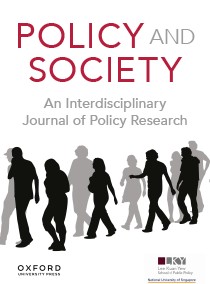启动政策:遍体鳞伤但仍屹立不倒
IF 5.7
1区 社会学
Q1 POLITICAL SCIENCE
引用次数: 0
摘要
自 20 世纪 90 年代以来,旨在提高失业者技能、激励和/或约束失业者的政策一直是大多数经合组织国家就业政策的基石。这些政策的核心是 "激活"(activation)理念--即享受福利的前提是参与某种活动。本文试图通过 "意识形态稳健性 "这一概念,分析 1990 年以来 "激活政策 "在国际上的发展,从而了解 "激活 "这一理念为何如此经久不衰。文章通过对激活政策的效果、合法性和相关性的批判,分析了激活理念的稳健性是如何不断受到挑战的。然而,在每一次争论中,激活思想的支持者都成功地保持了这一思想作为决策参考点的相关性。为此,他们重新平衡了激活的学科方法和扶持方法,为激活政策增加了新的适用范围,并重新阐明了关于客户代理的基本假设。分析进一步揭示了这些稳健性机制是如何成功地利用了批评意见,因为这些批评意见被纳入了有关效果评估、实施缺陷和新治理形式的技术性和看似非政治性的语言中。政策制定者因此能够淡化激活政策的合法性、公平性和公正性等规范性问题。因此,激活政策的理念已成为一个需要尽可能有效和高效地实施的目标,而不是一个需要讨论或质疑的理念。然而,虽然激活的理念依然强大,但激活政策的治理和实施结构却并非如此。我们的研究表明,在过去的 30 年中,这些治理安排和实施结构几乎一直在改革,这在一定程度上是由于人们的批评从激活理念转向了这些结构和安排。因此,颇为矛盾的是,激活理念的稳健性是通过降低具体激活政策和治理安排的稳健性而实现的。本文章由计算机程序翻译,如有差异,请以英文原文为准。
Activation policy: bruised and battered but still standing
Policies aimed at upskilling, motivating and/or disciplining the unemployed have remained a cornerstone of most OECD countries’ employment policies since the 1990s. Central to these policies is the idea of activation – i.e. the premise that benefit entitlement is conditional on one’s participation in some kind of activity. This article seek to understand how this idea of activation has proven so enduring by analyzing the international development of Activation Policies since 1990 through the lens offered by the concept of ideational robustness. It is analyzed how the robustness of the idea of activation has been continuously challenged through critiques raised against the effects, the legitimacy and the relevance of activation policies. Yet, in each of these moments of contest, proponents of the idea of activation succeeded in keeping the idea relevant as a point of reference for policymaking. They did so by rebalancing disciplinary and enabling approaches to activation, adding a new scope of application for activation policies, and rearticulating the underlying assumption about client agency. The analysis further reveals how these robustness mechanisms succeeded in appropriating the critiques due to their inscription within the technical and seemingly de-political language concerning effect evaluations, implementation deficits, and new forms of governance. Policymakers were thereby able to downplay normative questions of the legitimacy, fairness, and justice of activation policies. The idea of activation has thus taken on a status as an objective to be implemented as effective and efficiently as possible rather than as an idea to be discussed or challenged. However, while the idea of activation remains robust, the same cannot be said of the governance and implementation structures of activation policies. Our study suggest that the near-constant reforms of these governance arrangements and implementation structures during the last 30 years are partly a consequence of critique being skewed from the idea of activation to these structures and arrangements. The robustness of the idea of activation has thus, rather paradoxically, come about by reducing the robustness of specific activation policies and governance arrangements.
求助全文
通过发布文献求助,成功后即可免费获取论文全文。
去求助
来源期刊

Policy and Society
Multiple-
CiteScore
18.00
自引率
6.50%
发文量
43
审稿时长
30 weeks
期刊介绍:
Policy and Society is a prominent international open-access journal publishing peer-reviewed research on critical issues in policy theory and practice across local, national, and international levels. The journal seeks to comprehend the origin, functioning, and implications of policies within broader political, social, and economic contexts. It publishes themed issues regularly and, starting in 2023, will also feature non-themed individual submissions.
 求助内容:
求助内容: 应助结果提醒方式:
应助结果提醒方式:


